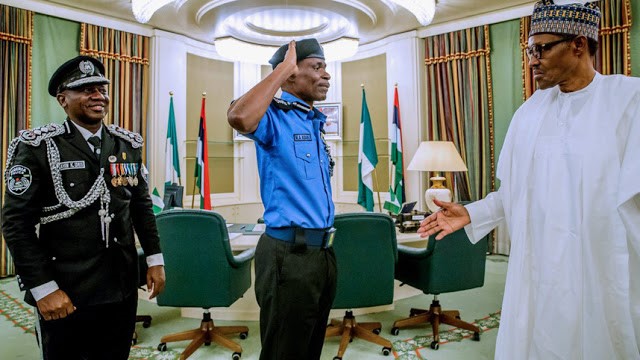Buhari Reorganises Police To Encourage Intelligence-Driven Operations

In his capacity as chairman of the Nigeria Police Council, President Muhammadu Buhari has approved the reorganisation of the Nigeria Police “with immediate effect”. The Inspector-General of Police (IGP), Mohammed Adamu, disclosed this in a memo shared with the media.
With the approval, the Force Criminal Investigation Department (FCID) has been decentralised resulting, for example, in the separation of the Force Intelligence Bureau from FCID
Adamu said a Deputy Inspector-General of Police would be appointed to head the new department.
“This is expected to fully integrate intelligence-led policing strategy to the community policing initiative in addressing the threats that the dynamics of crime poses to the country,” he explained.
The force now has eight departments with the restructuring, the IGP said, adding that five new zonal commands had been created to bring the police closer to Nigerians.
The new zonal commands are Ondo/Ekiti with the headquarters in Akure; Enugu/Anambra/Ebonyi with headquarters in Awka and Bayelsa/River with headquarters in Yenagoa.
The others are Yobe/Borno Command with headquarters in Maiduguri and Katsina/Kaduna Command with headquarters in Katsina.
“In order to enhance the capacity of the four premiere Police Colleges in Kaduna, Ikeja, Maiduguri and Orji-River towards meeting the training and capacity development projection of the Force in relation to junior cadre officers, Mr President approved that the status of the Commandants of the Colleges be upgraded to the rank of Assistant Inspector-General of Police (AIG),” Adamu said.
He added, “This will strengthen administration, enhance the commitment of staff, and engender a higher level of discipline and the quality of training at the colleges.
“These approvals were granted by the president in furtherance to the need to expand and strengthen the Intelligence Department towards driving the intelligence-led policing strategy of the Force leadership and to aid in the entrenchment of the community policing practice as approved by the Federal Government.”
The FIB is the highest intelligence-gathering unit of the police. It identifies criminal syndicates, shares criminal intelligence with various police formations, and maintains surveillance on various groups.
Support Our Journalism
There are millions of ordinary people affected by conflict in Africa whose stories are missing in the mainstream media. HumAngle is determined to tell those challenging and under-reported stories, hoping that the people impacted by these conflicts will find the safety and security they deserve.
To ensure that we continue to provide public service coverage, we have a small favour to ask you. We want you to be part of our journalistic endeavour by contributing a token to us.
Your donation will further promote a robust, free, and independent media.
Donate HereStay Closer To The Stories That Matter




